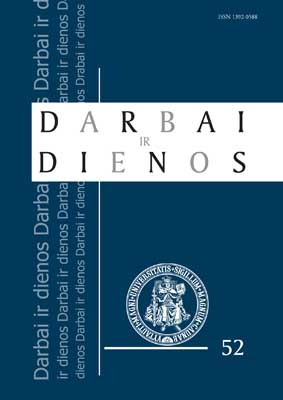Nuo nomenklatūros iki pseudobiurokratijos: posovietinės viešosios biurokratijos bruožai Lietuvoje
From Nomenklatura to Pseudo-Bureaucracy: Features of the Post-Soviet Public Bureaucracy in Lithuania
Author(s): Saulius PivorasSubject(s): Cultural Essay, Political Essay, Societal Essay
Published by: Vytauto Didžiojo Universitetas
Keywords: bureaucracy; nomenclature; public service; biurokratija; nomenklatūra; valstybės tarnyba;
Summary/Abstract: Šio straipsnio tikslas – panagrinėti, kaip ir kokia prasme galima kalbėti apie sovietinės biurokratinės sistemos bruožų perėmimą / tęstinumą ir jų įtaką / poveikį dabartinei Lietuvos viešosios biurokratijos sistemai. Toks analizės pobūdis pasirinktas todėl, kad literatūroje dažniausiai viešojo administravimo reformos grindžiamos svyravimu tarp klasikinės biurokratinės sistemos ir naujosios viešosios vadybos modelio, o tai klaidina, nes neįvertina Lietuvos specifikos, kurią, galima daryti prielaidą, sudaro sovietinio laikotarpio ar tiesiog sovietinis paveldas. Taip pat norima iš laiko perspektyvos apibrėžti esmines viešosios biurokratijos virsmų kryptis ir išdavas. Pagrindiniai atlikto tyrimo metodai – teorinė ir pirminių bei antrinių šaltinių analizė. Straipsnyje, pasitelkus teorinę literatūrą ir jau esamus darbus panašia tematika, kur bandoma nuosekliau kalbėti apie sovietinį Lietuvos viešosios biurokratijos paveldą, analizuojami įvairūs su Lietuvos viešąja biurokratija susiję duomenys. This article attempts to substantiate a persistence of features of the Soviet bureaucratic-administrative system to the extent these can be discussed, and their influence on the public bureaucracy of the independent Republic of Lithuania. It is claimed that the purpose of the reforms in Lithuania’s State civil services was to develop a stable, professional, and politically neutral public bureaucracy, i.e., a classical bureaucracy based on Max Weber’s type of an ideal bureaucracy. Certain aspects of reforms were successfully implemented. However, at the behavioral level, the public bureaucracy in post-Soviet Lithuania is still predominately a variant of a pseudo-bureaucracy. Signs of protecting managers at the expense of ordinary employees, a practice rooted in the nomenklatura, can still be found in Lithuania’s civil service. They become clear when observing how the instruments for a career and compensation are in reality applied in civil service. The outcome of the annual performance evaluations from 2003 to 2006 of Lithuanian civil servants for a career in civil service was clearly disproportionate with respect to the financial incentives for those public bureaucrats who hold managerial or senior positions. Political control of the bureaucracy noticeably weakened from 2002 to 2008. This is first of all related to the corrections made to the Law on Civil Service and other laws. On the one hand, the purpose for the reforms was to counter the practice of politicized personnel management in civil service. On the other, needed attention was not paid to the twofold nature of politicization. Along with personnel management that is politicized, the functional politicization of the upper levels of civil service is also known. The latter is specifically considered to be one of the prerequisites for the successful implementation of public policy, an adequate means of the political control of public administration.
Journal: Darbai ir dienos
- Issue Year: 2009
- Issue No: 52
- Page Range: 159-174
- Page Count: 16
- Language: Lithuanian

